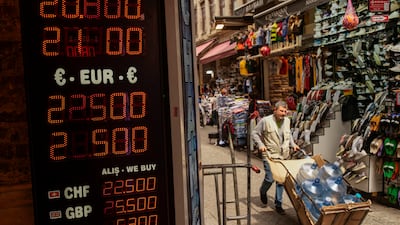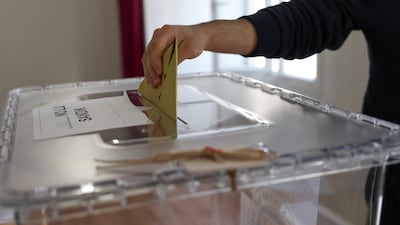Turkish residents in the UAE say opinion is split over the future direction of the country as a crunch election remains on a knife-edge, despite a record turnout from voters.
Long-serving President Recep Tayyip Erdogan on Sunday won 49.4 per cent of the votes, short of the 50 per cent threshold needed to clinch victory in the first round.
His opponent, Kemal Kilicdaroglu, secured 44.96 per cent, while third-placed candidate Sinan Ogan had 5.2 per cent.
The turnout was a record-high 88.8 per cent.
The result means that the election will go to a run-off between Mr Erdogan and Mr Kilicdaroglu on May 28, the first in Turkey's history.
A run-off vote takes place when no candidate receives more than 50 per cent of the presidential vote.
Turkish citizens who live in the UAE said the results are a clear indication of how their country is split by Mr Erdogan's leadership.
"Turkey is a divided country," said Kemal Yazici, owner of Bedia Art Gallery in Dubai's Al Quoz, adding that people are confused after the results.
"A lot of people want a change and are voting for Kilicdaroglu. At the same time, Erdogan is dearly loved by many people and they want him to win," Mr Yazici told The National.
He said that people appreciate Mr Erdogan's strong leadership and how he has developed the economy, infrastructure and public health.

"Many people believe that he [Erdogan] has done a lot for the country," Mr Yazici said. "The results so far point to another win for him as the President."
The divisions, he said, would split the vote between the two main contenders.
"It's complex politics," Mr Yazici said. "We have so many ethnic groups and they all think differently. The Turkish diaspora are also divided."
There are an estimated 3.4 million Turkish citizens living abroad, most of whom in Europe voted for Mr Erdogan.
In Germany, where the Turkish community of three million is the largest expatriate group, Mr Erdogan was ahead with 65 per cent of votes to 33 per cent for Mr Kilicdaroglu.
Mr Erdogan led by wide margins among Turkish voters in Belgium, Austria, the Netherlands and France, while Mr Kilicdaroglu led among those in the UK and Switzerland.
In the UAE, Turkish voters were split. According to poll carried out by Turkish newspaper Yeni Safak, Mr Kilicdaroglu won 69.8 per cent of votes in Dubai, while Mr Erdogan won 50.8 per cent in Abu Dhabi.

"I was awake all night following the results and I am not happy that we have a run-off," said Mr Yazici. "But we will definitely vote again as it is our responsibility as Turkish citizens."
Serhat Suha, a Turkish resident and senior fellow at UAE-based think tank Trends, said the results also did not come as a surprise to him.
"Erdogan is a shrewd politician," he told The National. "He would not have announced his candidacy if he were not confident about his win."
Mr Suha believes Mr Erdogan won votes by tapping into identity politics and hyper nationalism.
In contrast, he said, the six-party coalition organised under Mr Kilicdaroglu's banner is difficult to hold together.
"People saw fragility and weakness in them," Mr Suha said. "Erdogan knows how to appeal to the emotions of people. He plays to a loyal, conservative voter group in the Anatolian heartland, while his rival gains sympathy from working middle-class and liberal people in coastal cities.
"There are people who are worried about democracy and freedom, but that is still a minority," he said.
Another Turkish resident in Dubai, who declined to be named, told The National that the election is about continuity versus change.
He said that the second round of elections will be "neck-and-neck" but should result in a conclusive victory for one candidate.
"One thing is clear: Turkish people still have an emotional connection to Erdogan that no other leader can claim," he said.
"People still think of him as their leader. Even with a strong rival, his vote share has not dipped considerably."






























